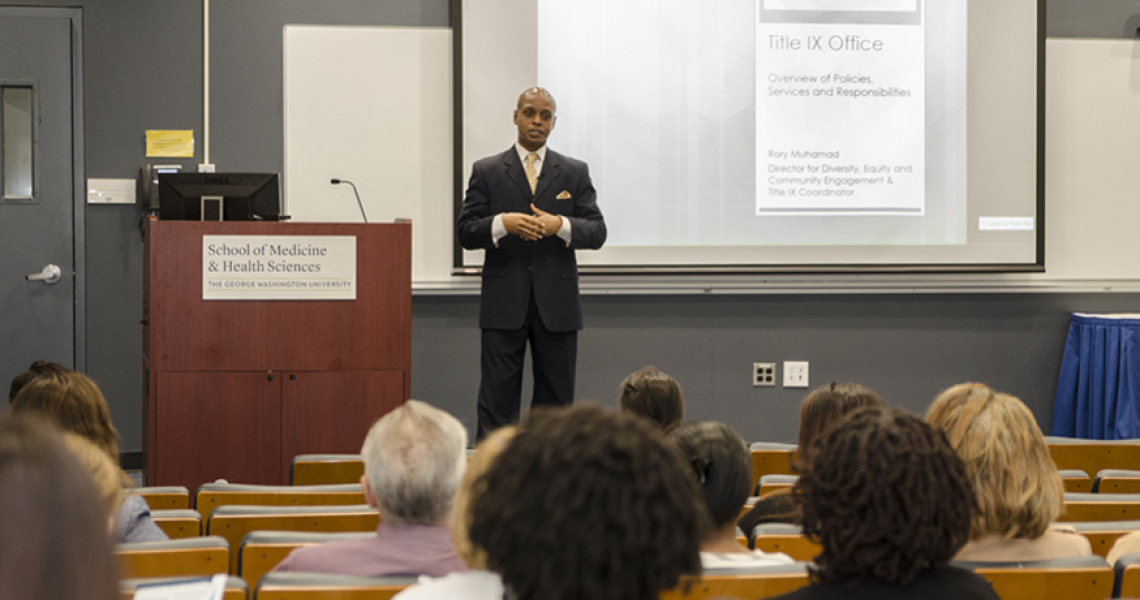Forty-six years ago, President Richard Nixon signed Title IX of the Education Amendments Act to address gender bias in educational institutions. The act says, “No person in the United States shall, on the basis of sex, be excluded from participation in, be denied the benefits of, or be subjected to discrimination under any education program or activity receiving Federal financial assistance.” To ensure all members of the George Washington University (GW) School of Medicine and Health Sciences (SMHS) community understand their rights and responsibilities around gender equality and sexual harassment, the SMHS Office of Diversity and Inclusion hosted a “Lunch and Learn” session on Title IX.
Grace Henry, EdD ’12, director of the SMHS Office of Diversity and Inclusion and adjunct assistant professor of medicine, invited Rory Muhammad, Title IX coordinator in the university’s Office of Diversity, Equity, and Community Engagement, to discuss the law. Title IX is often considered an athletics issue, but actually features 10 areas of bias protection spanning all aspects of the learning environment.
“We want to demystify what it means when we hear the topic Title IX,” Henry said at the start of the session. “We want to make sure when we think of diversity and inclusion, we’re remembering the inclusion part. If you work or learn here, you should feel like you belong, like you’re respected, like there’s a community of civility. That is our focus.”
Muhammad focused his presentation on sexual harassment but emphasized that Title IX covers many areas of gender discrimination, from access to STEM programs to issues in standardized testing and technology.
If, he said, “the university knows or reasonably should know about sexual harassment or sexual violence that creates a hostile environment,” then it must properly investigate the claim, eliminate the issue, prevent it from reoccurring, and address the effects of the incident.
GW’s policies cover everyone, from faculty, staff, and students to individuals affiliated with the university, and even those who just walk through campus. “We’re responsible for making sure the environment, and our campus, is free from violence,” Muhammad said.
Certain members of the GW community are required to report information about sexual harassment to his department, Muhammad said. He added that it’s important to know whether you’re a responsible university employee, and if you are, make the person confiding in you aware of your role before they divulge sensitive information.
Individuals who must report information on sexual harassment include deans, provosts, department chairs, deputy, vice, assistant, and associate deans, as well as employees who directly report to those in any of the above roles. In addition, resident advisors, directors and coordinators, and individuals who directly supervise student workers, faculty members, or other staff are required to report.
The university has many resources in place to assist victims of sexual harassment and violence, including GW’s Sexual Assault Response Consultative (SARC) Team; the Colonial Health Center’s Mental Health Services; Tamara Washington, the victim services coordinator with the GW Police Department; and the university’s HAVEN website, a centralized location for Title IX information.
“Our job is to try to make a better culture on campus,” Muhammad said. “This is not just a GW issue, it’s a societal issue. And our job is to make GW a place where we can say ‘we’re addressing it, we’re trying to prevent it, and we’re going to eradicate it and make this a more inclusive environment.’”
